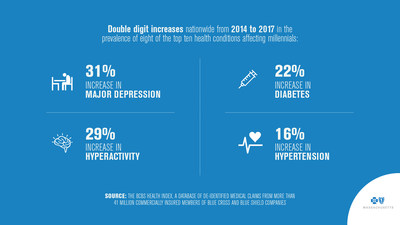BOSTON, April 24, 2019 /PRNewswire/ -- Older millennials in Massachusetts are more likely than their peers across the country to have behavioral health conditions, according to the latest Health of America report from the Blue Cross Blue Shield Association. The report also found that for the average millennial, health begins to decline at age 27; millennials are not as healthy as members of generation X were at the same age; and about a third of millennials nationwide have conditions that significantly affect their health, reducing their quality of life and life expectancy.

"This is interesting new data that challenges the assumption that millennials are healthier than the generation that came before them," said Bruce Nash, MD chief physician executive at Blue Cross Blue Shield of Massachusetts. "These findings raise significant concerns about the long-term wellbeing of millennials, both here in the Commonwealth and across the country."
Six of the top 10 conditions affecting millennials are behavioral health conditions - depression, hyperactivity, psychotic conditions and substance use disorders. In Massachusetts, millennials aged 34 to 36 experience more behavioral health conditions than the national average, with only seven states faring worse.
"The fact that behavioral health conditions among Massachusetts millennials are above the national average may relate to the state of behavioral health care in Massachusetts," said Nash. "We have more behavioral health professionals per capita than any other state. This larger care network means more diagnoses of these conditions. It's incumbent on the health care community to ensure that people are getting the care they need."
Nearly 73 million people in the U.S. are millennials – born between 1981 and 1996 – and the group will soon become the largest generation in the country. According to the Brookings Institute, millennials make up nearly a quarter of the total U.S. population and almost two-fifths of the working-age population.
"If this troubling trend continues, we could see health care costs rise significantly as millennials require more medical and behavioral health care," said Nash. "Our broader economy would also suffer as these health conditions affect workplace productivity. This report highlights the need to better understand and improve the millennial generation's long-term health."
Nationally, the report found double-digit increases nationwide from 2014 to 2017 in the prevalence of eight of the top 10 health conditions affecting this population:
- 31 percent increase in major depression
- 29 percent increase in hyperactivity
- 22 percent increase in type II diabetes
- 16 percent increase in hypertension
The study also found that millennial women are 20 percent less healthy than their male counterparts, specifically driven by cases of major depression, type II diabetes and endocrine conditions.
Furthermore, millennials between the ages of 34 and 36 experienced a higher prevalence of 8 of 10 health conditions than members of Generation X did at the same age, including:
- 37 percent higher prevalence of hyperactivity
- 19 percent higher prevalence of diabetes
- 18 percent higher prevalence of major depression
About the report
The "Health of America Report: The Health of Millennials" uses the Blue Cross Blue Shield Health Index. The index quantifies over 200 different health conditions to identify which diseases and conditions most affect Americans' longevity and quality of life. It is powered by annual data from more than 41 million commercially insured BCBS members. The BCBS Health Index informs national and local discussions about how to improve U.S. health, health policy and healthcare practice. This is the 26th Health of America Report from the Blue Cross Blue Shield Association. For more information on this and previous reports visit www.bcbs.com/the-health-of-america/reports.
About the Blue Cross and Blue Shield Association
The Blue Cross and Blue Shield Association is a national federation of 36 independent, community-based and locally operated Blue Cross and Blue Shield companies that collectively provide health care coverage for one in three Americans. BCBSA provides health care insights through The Health of America Report series and the national BCBS Health Index. For more information on BCBSA and its member companies, please visit bcbs.com. We also encourage you to connect with us on Facebook, check out our videos on YouTube, follow us on Twitter and check out our blog.
About Blue Cross Blue Shield of Massachusetts
Blue Cross Blue Shield of Massachusetts (bluecrossma.com) is a community-focused, tax-paying, not-for-profit health plan headquartered in Boston. We are committed to the relentless pursuit of quality, affordable health care with an unparalleled consumer experience. Consistent with our promise to always put our members first, we are rated among the nation's best health plans for member satisfaction and quality. Connect with us on Facebook, Twitter, YouTube, and LinkedIn.

SOURCE Blue Cross Blue Shield of Massachusetts

